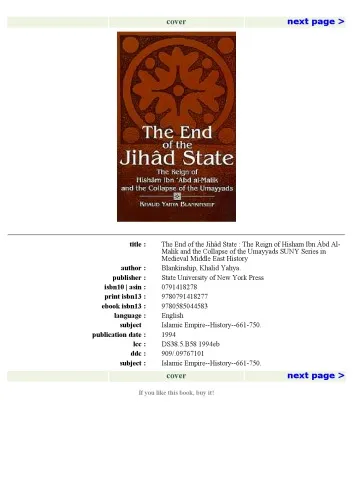Al-Qaida's Jihad in Europe: The Afghan-Bosnian Network
4.5
بر اساس نظر کاربران

شما میتونید سوالاتتون در باره کتاب رو از هوش مصنوعیش بعد از ورود بپرسید
هر دانلود یا پرسش از هوش مصنوعی 2 امتیاز لازم دارد، برای بدست آوردن امتیاز رایگان، به صفحه ی راهنمای امتیازات سر بزنید و یک سری کار ارزشمند انجام بدینکتاب های مرتبط:
معرفی کامل کتاب "Al-Qaida's Jihad in Europe: The Afghan-Bosnian Network"
کتاب "Al-Qaida's Jihad in Europe: The Afghan-Bosnian Network" نوشته ایوان اف کُلمه، یک اثر پژوهشی جامع و جذاب است که نگاهی عمیق به جنبههای کمتر شناخته شده از ظهور و فعالیت شبکه القاعده در اروپا دارد. این کتاب به طور ویژه نقش جنگ افغانستان و جنگ بوسنی را در تشکیل شبکهای پیچیده از جهادگران بررسی میکند. ایوان اف کُلمه با استفاده از صدها منبع حمایتی، اسناد امنیتی، و مصاحبههای دست اول، تصویری روشن از همکاریها و چالشهای تاریخی میان بازیگران مختلف جهادی ارائه میدهد.
این کتاب برای محققین، دانشجویان علوم سیاسی، و افرادی که به مطالعات تروریسم علاقهمند هستند، اطلاعات دقیقی درباره فرآیندهای جذب نیرو، تأمین مالی، و شبکهسازی Al-Qaida در سطح بینالمللی فراهم میکند. اهمیت این کتاب در بررسی تحلیلی تاریخی و ارتباطهای پنهانی است که به ندرت در سایر منابع به این دقت مستند شده است.
خلاصهای جامع از محتوای کتاب
ایوان اف کُلمه در این کتاب، داستان شبکهای غیرقابل تصور از ارتباطها و همکاریها را بازگو میکند که بین افغانستان، بوسنی، و بخشهایی از اروپا شکل گرفته است. این اثر نشان میدهد چگونه جنگندگان از جنوب آسیا، خاورمیانه، و شمال آفریقا در کنار یکدیگر، تحت حمایت Al-Qaida، در جنگ بوسنی شرکت کردند. نویسنده توضیح میدهد که چگونه این تعامل باعث تقویت شبکه جهادی شد و برخی از خطرناکترین حملات تروریستی در اروپا را تسهیل کرد.
این کتاب به جزئیات همکاریهای استراتژیک میان جنگجویان محلی بوسنیایی و عوامل خارجی میپردازد و از روند انتقال ایدئولوژیهای افراطی به اروپا پرده برمیدارد. همچنین، نقش شخصیتهای کلیدی مانند اسامه بن لادن و سایر رهبران ارشد جهادی در تقویت این شبکه توضیح داده شده است.
نکات کلیدی که از کتاب میآموزیم
- تأثیرات جنگ افغانستان و بوسنی بر شکلگیری و گسترش شبکههای جهادی در اروپا.
- تحلیل دقیق از روشهای جذب نیرو، تأمین مالی و سازماندهی توسط Al-Qaida.
- نقش تکنولوژی و رسانههای مدرن در تبلیغات و ترویج ایدئولوژیهای جهادی.
- ارتباط مستقیم میان شبکههای تروریستی در خاورمیانه و حملات تروریستی در اروپا.
نقلقولهای معروف از کتاب
“The war in Bosnia was not just a test of military strength; it was a pivot in the ideological nourishment of jihadist networks in Europe.”
“In understanding Al-Qaida’s operational strategies, one must delve into the silent corridors of European mosques and community centers.”
چرا این کتاب اهمیت دارد؟
کتاب "Al-Qaida's Jihad in Europe: The Afghan-Bosnian Network" یکی از منابع بنیادی برای درک بهتر تاریخچه و عملکرد شبکه القاعده در اروپا است. موضوعات مطرح شده در آثار امنیتی و تحقیقات دانشگاهی بسیار کمی با این عمق و دقت مورد بررسی قرار گرفتهاند. این کتاب خوانندهها را به چالش میکشد تا درباره سیاست خارجی، مداخلات نظامی، و تأثیرات بلندمدت آنها بر امنیت بینالمللی دیدگاهی جدید پیدا کنند.
اگرچه این کتاب عمدتاً برای جامعه دانشگاهی نوشته شده است، اما خوانندگان عمومی که به درک بهتر پدیدههای پیچیده جهادی علاقهمند هستند نیز میتوانند از آن بهرهمند شوند. این اثر بینش عمیقی درباره سیاستهای جهانی، امنیت بینالمللی، و راهبردهای مقابله با تروریسم ارائه میدهد.
Introduction to 'Al-Qaida's Jihad in Europe: The Afghan-Bosnian Network'
Written by renowned terrorism analyst Evan F. Kohlmann, 'Al-Qaida's Jihad in Europe: The Afghan-Bosnian Network' provides a meticulously researched and chilling account of the nexus between international jihadist networks and war-torn regions like Bosnia. The book sheds light on the critical role Bosnia played during the 1990s as a hub for recruiting, training, and deploying foreign fighters who later became instrumental in orchestrating global terrorist attacks. By dissecting hidden ties between Afghanistan's jihadist leadership and Europe, the book enables readers to understand how historical conflicts shaped today’s global security threats.
Using primary sources, including declassified intelligence reports, court documents, and first-hand accounts, Kohlmann highlights how the Afghan mujahideen movement evolved into a transnational web of extremism. The book primarily focuses on the European theater, where jihadists exploited local insurgencies and refugee crises, turning Bosnia into a platform for uniting militants from diverse countries under a single extremist cause.
Through an analysis of specific individuals and networks responsible for expanding Al-Qaida's ideology, the author unravels the complex operations that connected training camps in Afghanistan to sleeper cells across Europe. As a groundbreaking investigation, this book is indispensable for policymakers, scholars, and anyone interested in understanding how irregular warfare and international jihadism intersected in the post-Cold War world. Below, we delve deeper into its summary, key takeaways, and lasting significance.
Detailed Summary of the Book
'Al-Qaida's Jihad in Europe' explores the historical and operational ties between militant groups in Afghanistan and Bosnia. It begins by chronicling how the war in Afghanistan during the 1980s created a vast pool of foreign fighters, often referred to as mujahideen, who were trained in guerrilla warfare and radical Islamic ideology. After the Soviet withdrawal, these fighters sought new battlegrounds, and the Yugoslav Wars of the 1990s offered a fertile landscape for their ambitions.
The book describes how Al-Qaida capitalized on the chaotic Bosnian War, embedding its operatives in the Balkan region under the guise of humanitarian workers and relief organizations. Kohlmann explains how this strategy allowed extremist groups to establish a foothold in Europe, recruiting local fighters, smuggling weapons, and spreading propaganda.
Using case studies, the book tracks prominent figures such as Anwar Shaaban, a charismatic jihadist leader based in Milan, who orchestrated logistical support for fighters in Bosnia and beyond. Additionally, Kohlmann examines the ripple effects of these operations, including how they enabled future attacks like the bombing of the World Trade Center in 1993 and the September 11 attacks.
Key Takeaways
- The Bosnian War served as a crucial stepping stone for Al-Qaida to expand its operational reach into Europe.
- Humanitarian conflicts can be exploited by terrorist networks for recruitment and organizational purposes.
- Connections established in the 1990s between Afghan and Bosnian jihadists shaped the transnational nature of modern terrorism.
- Local insurgencies, when coupled with unregulated arms flows and international apathy, can foster long-term extremist networks.
Famous Quotes from the Book
"Behind every terrorist act stands a hidden nexus of individuals—a web of connections, meticulously formed across continents, spanning years, and fused together under the banner of jihad."
"The Bosnian jihad was not an isolated phenomenon—it was a critical chapter in the globalization of Al-Qaida and its ideology."
Why This Book Matters
Understanding the origins and operations of modern terrorism is essential in today’s world, where asymmetrical threats endanger global security. 'Al-Qaida's Jihad in Europe' offers a unique lens to assess how lightly monitored conflicts like the Bosnian War can serve as breeding grounds for international movements like Al-Qaida. It provides context for ongoing issues such as the radicalization of foreign fighters and the role of fractured states in perpetuating security crises.
For policymakers, this book serves as a compelling warning about the dangers of ignoring extremist activities in localized wars. For scholars and analysts, it offers valuable documentation and insights into one of the most consequential periods in the history of terrorism. Evan F. Kohlmann’s investigative rigor ensures that the book remains an authoritative resource for anyone seeking to unravel the complex web of jihadist networks.
دانلود رایگان مستقیم
شما میتونید سوالاتتون در باره کتاب رو از هوش مصنوعیش بعد از ورود بپرسید
دسترسی به کتابها از طریق پلتفرمهای قانونی و کتابخانههای عمومی نه تنها از حقوق نویسندگان و ناشران حمایت میکند، بلکه به پایداری فرهنگ کتابخوانی نیز کمک میرساند. پیش از دانلود، لحظهای به بررسی این گزینهها فکر کنید.
این کتاب رو در پلتفرم های دیگه ببینید
WorldCat به شما کمک میکنه تا کتاب ها رو در کتابخانه های سراسر دنیا پیدا کنید
امتیازها، نظرات تخصصی و صحبت ها درباره کتاب را در Goodreads ببینید
کتابهای کمیاب یا دست دوم را در AbeBooks پیدا کنید و بخرید
1540
بازدید4.5
امتیاز0
نظر98%
رضایتنظرات:
4.5
بر اساس 0 نظر کاربران
Questions & Answers
Ask questions about this book or help others by answering
No questions yet. Be the first to ask!















